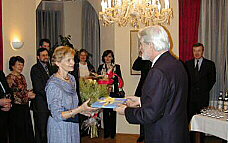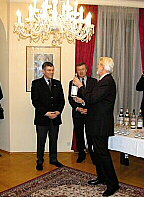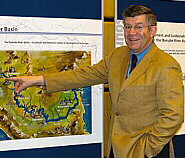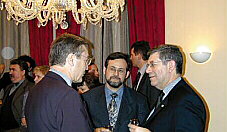 |
| Joachim Bendow thanks Martina Motlova, the outgoing president |
The event took place at the Embassy of the Czech Republic in Vienna. The
diplomatic representatives of the Danube countries in Vienna attending the
ceremony on the joint invitation by the Czech Embassy and the ICPDR executive
secretary were welcomed by Deputy Ambassador Petr Mooz on behalf of the
Czech Embassy. Joachim Bendow, the executive secretary of the ICPDR, thanked
Martina Motlova, the outgoing president, for her dedicated contribution
to ICPDR’s smooth operation in 2002. Ms. Motlova’s personal and
professional leadership has added value to the work of the ICPDR and strongly
supported the activities of the Permanent Secretariat. Danube Watch joins
in the expression of gratitude to Ms. Motlova for her excellent chairmanship
throughout 2002!
The bottle of Danube water that was handed over to Fritz Holzwarth, the
new president, is a symbolic reminder of his responsibility for achieving
good status of surface and groundwater in the Danube River Basin. In his
address, Mr. Holzwarth emphasised his commitment to further developing basin-wide
cooperation for the benefit of all Danube countries.
Danube Watch has interviewed Mr. Holzwarth to find out about his expectations
and plans as president of the ICPDR.
 |
| A bottle of Danube water for the new president |
DANUBE WATCH: Welcome to your new position, Mr. President. Please tell us more about your professional background and experience and in what way they will help you perform your new duties.
HOLZWARTH: Since 1996 I have been Deputy Director General in the German Federal Ministry for the Environment, responsible for marine environment, water management, soil protection and the clean-up of contaminated sites. During this period I have gained a body of experience in international co-operation ranging from bilateral and multilateral negotiations with our partners in trans-boundary river basins, in the Baltic Sea and northeastern Atlantic to the global activities in the framework of the United Nations following the Rio and Johannesburg summits. At the European level, I have been actively involved in negotiations leading to the EU Water Framework Directive (WFD) and as one of the so-called EU water directors I am still closely contributing to the Common Strategy for the Implementation of the WFD and to further development of water policies in the EU. I will do my best to make this experience useful for the ICPDR.
DANUBE WATCH: What do you see as the ICPDR’s priorities in the upcoming years and what will be your personal goals during your presidency?
HOLZWARTH: There is no question that the implementation of the WFD will be ICPDR’s first priority in the years to come. In my view, the decision the ICPDR members made as early as 2000 to commit themselves to developing a co-ordinated river basin management plan for the entire Danube Basin is a major accomplishment that highlights the willingness of all partners to live up to their responsibilities and to contribute to the work irrespective of the obvious differences in their respective economic, social and administrative capacities. Another priority concerns the implementation of the Joint Action Programme. Last but not least - and this is one my personal goals for my presidency - better integrating new members such as Ukraine and Serbia and Montenegro as well as establishing contacts with those countries in the Basin that are not members of the ICPDR are important challenges.
 |
| Fritz Holzwarth backs ICPDR’s agenda with his own vision |
DANUBE WATCH: All European water managers are currently working on the implementation of the WFD. How, in your opinion, can the ICPDR - as a platform for WFD implementation in the Danube Basin – secure a smooth development of the Danube River Basin Management Plan?
HOLZWARTH: As a platform for exchanging information, sharing experiences and co-ordinating efforts for better implementation, the ICPDR will, on the one hand, have to concentrate on those issues and problems that are relevant for larger parts of the Basin. However, against the background of the structural differences between the countries, it will also have a role to play in facilitating the transfer of know-how and experience, by relying in particular on the support of the UNDP/GEF Danube Regional Project. I like to refer to this project as a lighthouse for GEF because of its successful beginning and its continuous implementation.
DANUBE WATCH: Since water flows downstream, problems such as flood waves and pollution are also carried downstream. Do you think that, as a result, upstream countries such as Germany bear a special responsibility regarding sustainable water management and the reduction of water pollution?
HOLZWARTH: One of the basic principles of an integrated approach to river basin management is shared but common responsibility. Each country in a basin has to make its best effort to ensure sustainable use of its water resources and protection of water ecosystems in its own interest but also in order to avoid negative impacts in other, mainly downstream countries. As failure to take suitable measures in the upstream part of the main river and its major tributaries may impact wider parts of the Basin, there is no doubt that upstream countries must pay particular attention to avoiding such impacts. However, it’s a two-way process in which problems must also be avoided in the downstream part of the River. For example, it is important to ensure flow continuity as a precondition for the mobility of migrating species. Germany and Austria continue to have a particular role to play in this respect due to their social and economic advantages and I do have the impression that their efforts and accomplishments are, indeed, widely recognized.
 |
| The handing-over ceremony is an opportunity to keep the Danube countries’ embassies informed about the activities of the ICPDR |
DANUBE WATCH: Four countries will join the European Union in May 2004 and we can expect another four to join it within the next decade. Do you think that this political process will have implications for the ICPDR over the next few years?
HOLZWARTH: As I mentioned earlier, as early as 2000 the ICPDR decided to work towards a coordinated river basin management plan as required by the WFD which at that point in time was not even in force. This decision was taken with the understanding that within several years the majority of the ICPDR member countries would be members of the European Union and bound by EU legislation. At least since this decision was taken, the EU legislation, standards and policies have to a large extent formed the basis for the activities of the ICPDR. In this respect I would say that the ICPDR has already adapted considerably to the political changes. However, the accession to the EU of more and more ICPDR member countries will most probably challenge the ICPDR in its role as a platform where EU members and non-EU countries work together on an equal footing. We have to keep in mind that the ICPDR is not just a type of implementing agency for EU legislation but that the Danube River Protection Convention forms the basis for our cooperation. Therefore, we have to think of ways and means to encourage active involvement and participation of those ICPDR member countries that will not become EU members in the foreseeable future.
DANUBE WATCH: Thank you for the interview.